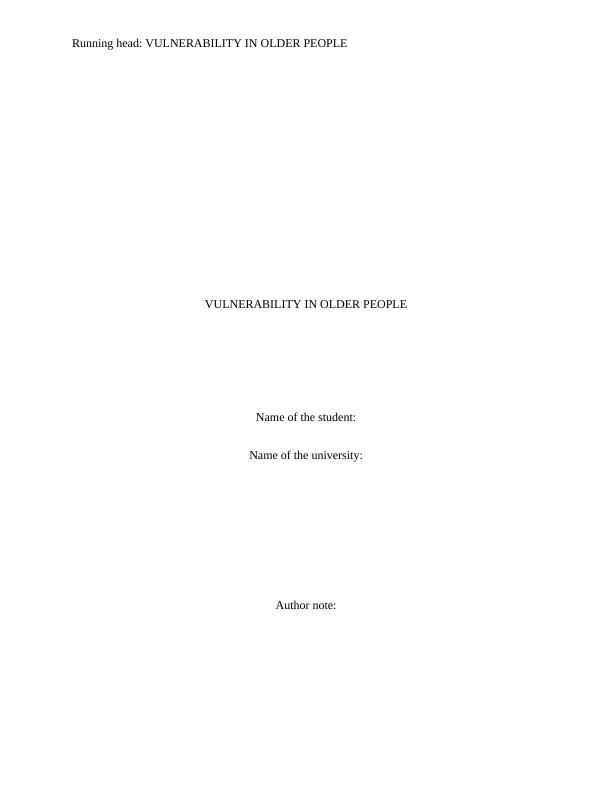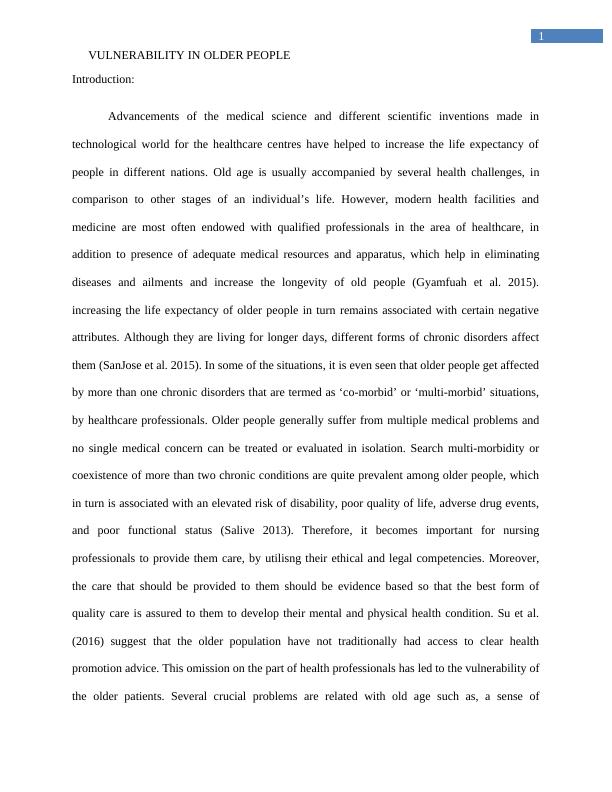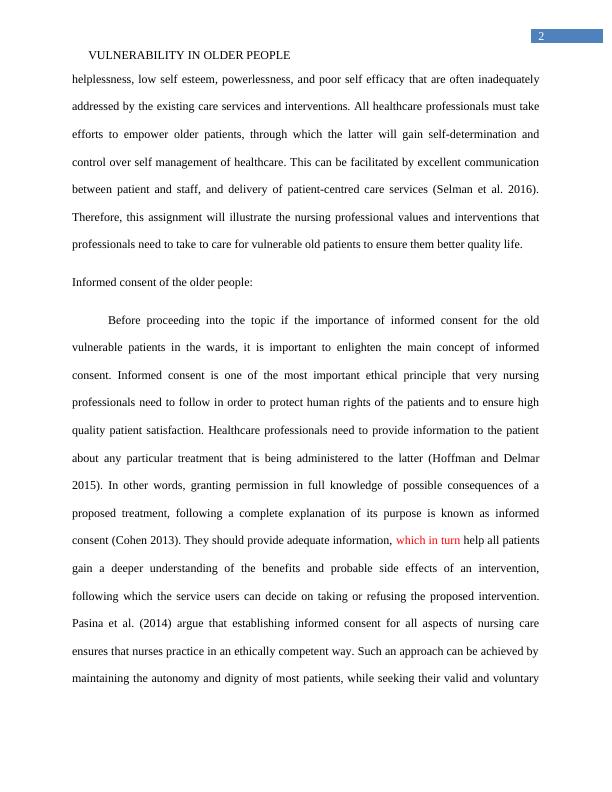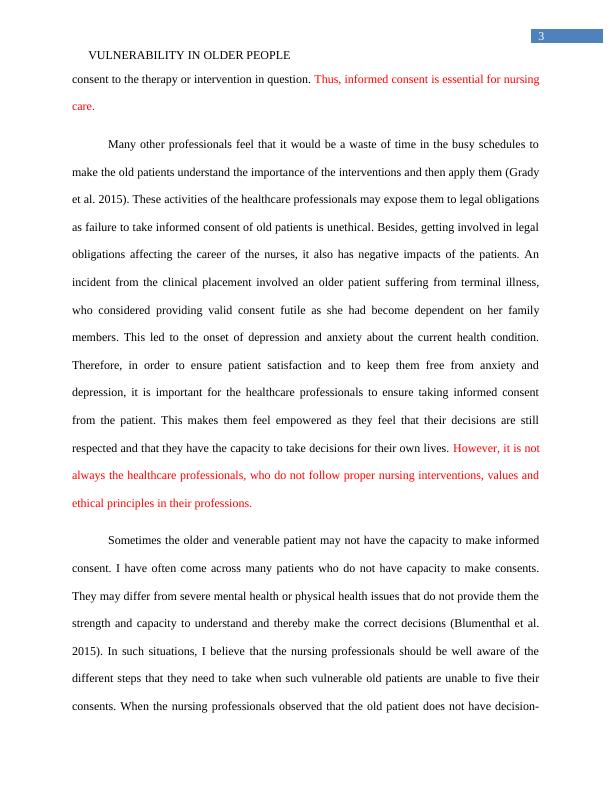Vulnerability in Older People: Nursing Professional Values and Interventions
Added on 2023-06-12
20 Pages6244 Words118 Views
Running head: VULNERABILITY IN OLDER PEOPLE
VULNERABILITY IN OLDER PEOPLE
Name of the student:
Name of the university:
Author note:
VULNERABILITY IN OLDER PEOPLE
Name of the student:
Name of the university:
Author note:

1
VULNERABILITY IN OLDER PEOPLE
Introduction:
Advancements of the medical science and different scientific inventions made in
technological world for the healthcare centres have helped to increase the life expectancy of
people in different nations. Old age is usually accompanied by several health challenges, in
comparison to other stages of an individual’s life. However, modern health facilities and
medicine are most often endowed with qualified professionals in the area of healthcare, in
addition to presence of adequate medical resources and apparatus, which help in eliminating
diseases and ailments and increase the longevity of old people (Gyamfuah et al. 2015).
increasing the life expectancy of older people in turn remains associated with certain negative
attributes. Although they are living for longer days, different forms of chronic disorders affect
them (SanJose et al. 2015). In some of the situations, it is even seen that older people get affected
by more than one chronic disorders that are termed as ‘co-morbid’ or ‘multi-morbid’ situations,
by healthcare professionals. Older people generally suffer from multiple medical problems and
no single medical concern can be treated or evaluated in isolation. Search multi-morbidity or
coexistence of more than two chronic conditions are quite prevalent among older people, which
in turn is associated with an elevated risk of disability, poor quality of life, adverse drug events,
and poor functional status (Salive 2013). Therefore, it becomes important for nursing
professionals to provide them care, by utilisng their ethical and legal competencies. Moreover,
the care that should be provided to them should be evidence based so that the best form of
quality care is assured to them to develop their mental and physical health condition. Su et al.
(2016) suggest that the older population have not traditionally had access to clear health
promotion advice. This omission on the part of health professionals has led to the vulnerability of
the older patients. Several crucial problems are related with old age such as, a sense of
VULNERABILITY IN OLDER PEOPLE
Introduction:
Advancements of the medical science and different scientific inventions made in
technological world for the healthcare centres have helped to increase the life expectancy of
people in different nations. Old age is usually accompanied by several health challenges, in
comparison to other stages of an individual’s life. However, modern health facilities and
medicine are most often endowed with qualified professionals in the area of healthcare, in
addition to presence of adequate medical resources and apparatus, which help in eliminating
diseases and ailments and increase the longevity of old people (Gyamfuah et al. 2015).
increasing the life expectancy of older people in turn remains associated with certain negative
attributes. Although they are living for longer days, different forms of chronic disorders affect
them (SanJose et al. 2015). In some of the situations, it is even seen that older people get affected
by more than one chronic disorders that are termed as ‘co-morbid’ or ‘multi-morbid’ situations,
by healthcare professionals. Older people generally suffer from multiple medical problems and
no single medical concern can be treated or evaluated in isolation. Search multi-morbidity or
coexistence of more than two chronic conditions are quite prevalent among older people, which
in turn is associated with an elevated risk of disability, poor quality of life, adverse drug events,
and poor functional status (Salive 2013). Therefore, it becomes important for nursing
professionals to provide them care, by utilisng their ethical and legal competencies. Moreover,
the care that should be provided to them should be evidence based so that the best form of
quality care is assured to them to develop their mental and physical health condition. Su et al.
(2016) suggest that the older population have not traditionally had access to clear health
promotion advice. This omission on the part of health professionals has led to the vulnerability of
the older patients. Several crucial problems are related with old age such as, a sense of

2
VULNERABILITY IN OLDER PEOPLE
helplessness, low self esteem, powerlessness, and poor self efficacy that are often inadequately
addressed by the existing care services and interventions. All healthcare professionals must take
efforts to empower older patients, through which the latter will gain self-determination and
control over self management of healthcare. This can be facilitated by excellent communication
between patient and staff, and delivery of patient-centred care services (Selman et al. 2016).
Therefore, this assignment will illustrate the nursing professional values and interventions that
professionals need to take to care for vulnerable old patients to ensure them better quality life.
Informed consent of the older people:
Before proceeding into the topic if the importance of informed consent for the old
vulnerable patients in the wards, it is important to enlighten the main concept of informed
consent. Informed consent is one of the most important ethical principle that very nursing
professionals need to follow in order to protect human rights of the patients and to ensure high
quality patient satisfaction. Healthcare professionals need to provide information to the patient
about any particular treatment that is being administered to the latter (Hoffman and Delmar
2015). In other words, granting permission in full knowledge of possible consequences of a
proposed treatment, following a complete explanation of its purpose is known as informed
consent (Cohen 2013). They should provide adequate information, which in turn help all patients
gain a deeper understanding of the benefits and probable side effects of an intervention,
following which the service users can decide on taking or refusing the proposed intervention.
Pasina et al. (2014) argue that establishing informed consent for all aspects of nursing care
ensures that nurses practice in an ethically competent way. Such an approach can be achieved by
maintaining the autonomy and dignity of most patients, while seeking their valid and voluntary
VULNERABILITY IN OLDER PEOPLE
helplessness, low self esteem, powerlessness, and poor self efficacy that are often inadequately
addressed by the existing care services and interventions. All healthcare professionals must take
efforts to empower older patients, through which the latter will gain self-determination and
control over self management of healthcare. This can be facilitated by excellent communication
between patient and staff, and delivery of patient-centred care services (Selman et al. 2016).
Therefore, this assignment will illustrate the nursing professional values and interventions that
professionals need to take to care for vulnerable old patients to ensure them better quality life.
Informed consent of the older people:
Before proceeding into the topic if the importance of informed consent for the old
vulnerable patients in the wards, it is important to enlighten the main concept of informed
consent. Informed consent is one of the most important ethical principle that very nursing
professionals need to follow in order to protect human rights of the patients and to ensure high
quality patient satisfaction. Healthcare professionals need to provide information to the patient
about any particular treatment that is being administered to the latter (Hoffman and Delmar
2015). In other words, granting permission in full knowledge of possible consequences of a
proposed treatment, following a complete explanation of its purpose is known as informed
consent (Cohen 2013). They should provide adequate information, which in turn help all patients
gain a deeper understanding of the benefits and probable side effects of an intervention,
following which the service users can decide on taking or refusing the proposed intervention.
Pasina et al. (2014) argue that establishing informed consent for all aspects of nursing care
ensures that nurses practice in an ethically competent way. Such an approach can be achieved by
maintaining the autonomy and dignity of most patients, while seeking their valid and voluntary

3
VULNERABILITY IN OLDER PEOPLE
consent to the therapy or intervention in question. Thus, informed consent is essential for nursing
care.
Many other professionals feel that it would be a waste of time in the busy schedules to
make the old patients understand the importance of the interventions and then apply them (Grady
et al. 2015). These activities of the healthcare professionals may expose them to legal obligations
as failure to take informed consent of old patients is unethical. Besides, getting involved in legal
obligations affecting the career of the nurses, it also has negative impacts of the patients. An
incident from the clinical placement involved an older patient suffering from terminal illness,
who considered providing valid consent futile as she had become dependent on her family
members. This led to the onset of depression and anxiety about the current health condition.
Therefore, in order to ensure patient satisfaction and to keep them free from anxiety and
depression, it is important for the healthcare professionals to ensure taking informed consent
from the patient. This makes them feel empowered as they feel that their decisions are still
respected and that they have the capacity to take decisions for their own lives. However, it is not
always the healthcare professionals, who do not follow proper nursing interventions, values and
ethical principles in their professions.
Sometimes the older and venerable patient may not have the capacity to make informed
consent. I have often come across many patients who do not have capacity to make consents.
They may differ from severe mental health or physical health issues that do not provide them the
strength and capacity to understand and thereby make the correct decisions (Blumenthal et al.
2015). In such situations, I believe that the nursing professionals should be well aware of the
different steps that they need to take when such vulnerable old patients are unable to five their
consents. When the nursing professionals observed that the old patient does not have decision-
VULNERABILITY IN OLDER PEOPLE
consent to the therapy or intervention in question. Thus, informed consent is essential for nursing
care.
Many other professionals feel that it would be a waste of time in the busy schedules to
make the old patients understand the importance of the interventions and then apply them (Grady
et al. 2015). These activities of the healthcare professionals may expose them to legal obligations
as failure to take informed consent of old patients is unethical. Besides, getting involved in legal
obligations affecting the career of the nurses, it also has negative impacts of the patients. An
incident from the clinical placement involved an older patient suffering from terminal illness,
who considered providing valid consent futile as she had become dependent on her family
members. This led to the onset of depression and anxiety about the current health condition.
Therefore, in order to ensure patient satisfaction and to keep them free from anxiety and
depression, it is important for the healthcare professionals to ensure taking informed consent
from the patient. This makes them feel empowered as they feel that their decisions are still
respected and that they have the capacity to take decisions for their own lives. However, it is not
always the healthcare professionals, who do not follow proper nursing interventions, values and
ethical principles in their professions.
Sometimes the older and venerable patient may not have the capacity to make informed
consent. I have often come across many patients who do not have capacity to make consents.
They may differ from severe mental health or physical health issues that do not provide them the
strength and capacity to understand and thereby make the correct decisions (Blumenthal et al.
2015). In such situations, I believe that the nursing professionals should be well aware of the
different steps that they need to take when such vulnerable old patients are unable to five their
consents. When the nursing professionals observed that the old patient does not have decision-

End of preview
Want to access all the pages? Upload your documents or become a member.
Related Documents
Changes in Healthcare Industrylg...
|9
|2194
|86
COMMUNITY HEALTHCARE - Average life expectancy for people in the United Stateslg...
|7
|1574
|340
BIO227 - Complexity of Diseases - Reportlg...
|12
|3361
|97
Designing Cultures of Care Design (PDF)lg...
|14
|4232
|49
Clinical Reasoning Cycle for Medication Management and Self-Management in Type 2 Diabeteslg...
|9
|2268
|79
Marketing Proposal for Affordable Skilled Nursing Facilitieslg...
|13
|623
|272
